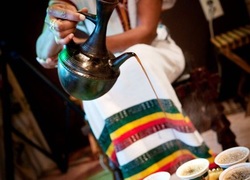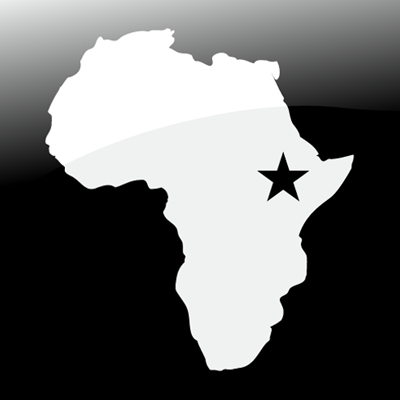
Unlike Americans, who generally take their coffee in a to-go cup, Ethiopians have an unhurried and elaborate ritual.
Every woman is practiced at roasting coffee. During the traditional coffee ceremony, washed green coffee beans are roasted in a dry pan over hot coals. The smoke of the roasting coffee beans is meant to entice the guests. When ready, the roasted beans are pounded in a mortar. Meanwhile, water is put to boil in a clay coffeepot called a jebena. The coffee is then brewed and poured into twelve small cups representing the twelve apostles. Sugar, and occasionally salt, are added to taste.
Coffee is Ethiopia's national beverage and a major export. It is believed that coffee takes its name from the province of Kafa in southwest Ethiopia, where it was discovered by an Ethiopian goatherd named Kaldi. Coffee in Amharic (Ethiopia's main language) is buna. 90% of Ethiopians earn their living through agriculture, many by growing coffee. Coffee is mostly channeled through the government's newly established Commodity Exchange in Addis Ababa, although organic and Fairtrade coffees bypass this system.
COFFEE FUNDRAISER:
If you are interested in purchasing organic and Fairtrade coffee from Ethiopian farmers, we have paired with Just Love Coffee for another adoption fundraiser. Just Love Coffee sells organic and Fairtrade coffee from around the world and donates $5 a bag to families raising money for adoption.
www.justlovecoffee.com/OurEthiopianDaughter
Every woman is practiced at roasting coffee. During the traditional coffee ceremony, washed green coffee beans are roasted in a dry pan over hot coals. The smoke of the roasting coffee beans is meant to entice the guests. When ready, the roasted beans are pounded in a mortar. Meanwhile, water is put to boil in a clay coffeepot called a jebena. The coffee is then brewed and poured into twelve small cups representing the twelve apostles. Sugar, and occasionally salt, are added to taste.
Coffee is Ethiopia's national beverage and a major export. It is believed that coffee takes its name from the province of Kafa in southwest Ethiopia, where it was discovered by an Ethiopian goatherd named Kaldi. Coffee in Amharic (Ethiopia's main language) is buna. 90% of Ethiopians earn their living through agriculture, many by growing coffee. Coffee is mostly channeled through the government's newly established Commodity Exchange in Addis Ababa, although organic and Fairtrade coffees bypass this system.
COFFEE FUNDRAISER:
If you are interested in purchasing organic and Fairtrade coffee from Ethiopian farmers, we have paired with Just Love Coffee for another adoption fundraiser. Just Love Coffee sells organic and Fairtrade coffee from around the world and donates $5 a bag to families raising money for adoption.
www.justlovecoffee.com/OurEthiopianDaughter








 RSS Feed
RSS Feed